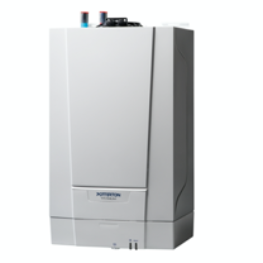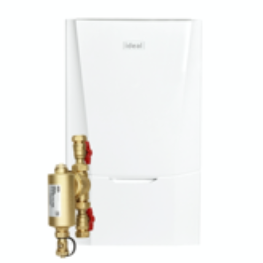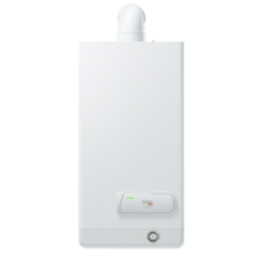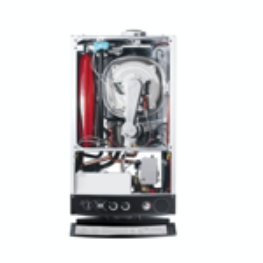Guide to Boiler Systems
When it comes to understanding your central heating system, and the type of boiler found within that system all the different types of jargon can get quickly get confusing. This is especially the case when the same boiler type can have different names to describe the same thing.The good news is if you are looking for a new boiler for your central heating, then it isn't as difficult as it might seem to understand the name, types and components that go to make up a central heating system. Generally speaking, when it comes to boilers there are only three main types of boiler available, and these are the ones typically found in your home
Conventional Boiler

If you have an older home, or have not updated your boiler for a while there is a good chance you'll have a conventional boiler. These also go by the names heat only boiler and regular boiler. The standard boilers can be identified primarily by the fact that you have a water tank for the boiler in your loft and a hot water tank in your airing cupboard. Because you need so much space to accommodate these central heating systems, they are more suitable for larger homes.
These boilers use gravity to feed water through to the boiler, which is why the water tank is usually found in the loft of a house. A separate hot water storage tank is used to hold hot water. The type of water cylinder used in a conventional heating system is called a vented cylinder, or an open vented system.
Because water needs to be heated in these systems in advance of use this can take quite a long time. This typically means you should set your heating controls up to provide you hot water when you are most likely to use it, such as in the morning before work, and for when you return in the evenings. Often, older versions of this boiler type are the least energy efficient so your energy bills are likely to be quite high when compared to other boiler types. This type of set up has a vent pipe that connects the cold-water storage tank in the loft to the hot water cylinder.
Explore our range of conventional heat only boilers at Mr Central Heating
Our RecommendationsPotterton Titanium 18
Ideal Logic+ 24
Baxi 630
System Boilers

When it comes to system boilers the main difference with these boilers is that they do not have a cold-water storage tank in the loft. However, they will still use a storage cylinder to hold the hot water in the heating system. This type of boiler draws water direct from the water mains to supply the system with water. This means that if there is very low water pressure from the mains supply, then these boiler-types may not be suitable for your requirements.
System boilers use unvented cylinders in their set up and the system itself is sealed. This helps to increase the water supply pressure in the system. An additional piece of kit, called an expansion tank is used to ensure that when the water in the system heats up, the excess water has a place to go (into the expansion vessel). Water expands when it is heated, so therefore the expansion tank is required.
One of the main benefits of a system boiler over a conventional boiler is that since they do not require a cold-water storage tank in the loft, less space is required for the boiler installation. The downside is that they do require more regular maintenance and installation costs are a little higher than a combi boiler. Another thing we've already touched on is that the mains water pressure is needed for a system boiler to work. If your home has very low pressure then a system boiler might not be the right boiler for you.
Explore our range of system boilers at Mr Central Heating
Our RecommendationsIdeal Vogue Max 32
Baxi Megaflo 32
Vokera Easi-Heat Plus 30S
Combi Boilers

The combi boiler (or combination boiler) is a popular type of boiler found in many modern homes and especially flats where space is at a premium. Combi boilers combine both the hot water heating requirements, but also the central heating too. These boilers also use mains water pressure to operate instead of a tank in the loft. If the mains pressure is very low in your home this type of boiler may not be suitable.
Some of the main benefits of a combi boiler is that they can heat hot water when it is required, since these boilers do not store hot water. So, you can have instant hot water when you need it. Another benefit is that this means that not only do these boilers not need a cold-water tank in the loft, but they do not need a hot water cylinder either. This not only saves space, but also on cost and adds a lever of simplicity to the overall installation. This means it should be cheaper for your heating engineer to install ensuring that the overall boiler cost is lower than other boiler types.
High output combi boilers are available too, meaning that the combi boiler is suitable for all types of dwellings. For example the Vaillant ecoTEC Plus 938 can deliver up to 20 litres of hot water per minute without the need for a separate hot water cylinder or loft water tank, making this boiler a great choice for a family home.
Explore our range of combi boilers at Mr Central Heating
Our RecommendationsVokera Easi-Heat Plus 32C
Ideal Logic Plus 30
Vaillant Plus 832
Condensing Boilers

Another phrase you might hear when you're looking at a new boiler is the phrase 'condensing boiler'. This isn't a completely different boiler type, such as regular, system or combi boiler, but instead a mechanism that a boiler uses for better energy efficiency. So, if you're wondering if you need to buy a combi boiler or a condensing boiler, the chances are, when it comes to modern boilers you're probably talking about the same thing. This means that a brand new conventional, system or combi boiler that uses gas or oil for fuel will likely be a condensing boiler too.
Condensing boilers are a rated in terms of efficiency, which means they are better for your wallet and the environment. These are the most efficient boilers you can buy for the home. However, due to the laws in the UK since 2005 all new boilers that are installed need to be a condensing boiler type.
The way a condensing boiler works is by reusing the heat from waste gasses generated by the boiler. Waste gasses, instead of being released directly to the environment first go via two heat exchangers which convert the excess, waste heat into additional energy. A condensate pipe is connected from the boiler to the outside of the building. This plastic pipe is used to transfer waste water from the boiler to the external drains and sewer.
Another important factor for condensing boilers is that they only work with certain fuel sources, either gas or oil. Gas is quite a typical fuel supply in England, but oil boilers are less common and are typically only found in locations where there is no gas supply, such as in rural locations. Therefore, if you can only heat your home with electricity, then you cannot use a condensing boiler.
Hopefully you've picked up a good understanding of what the different types of boilers are and how boilers work from this guide. You can shop for a replacement boiler at Mr Central Heating. However, if you have further questions please do not hesitate to contact Mr Central Heating who can help you pick the correct boiler for your home. Speak to someone at a local Mr Central Heating Store today.














